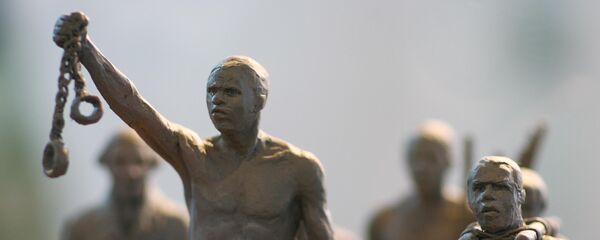Holbourne also founded Black Activists Rising against Cuts (BARAC) and is a seasoned trade unionist via the Trade Union Congress (TUC), Action for South Africa (ACTSA), and others.
Sputnik: Why is it important for British people to learn about Black History Month? What does it symbolize for Britons and how is it different from celebrations in the United States?
Zita Holbourne: It is important that we commemorate Black History and include it in history books, core curriculums, and every other aspect of history because it is world history and should not remain confined to a month, but celebrated year-round.
The American version of Black History Month inspired ours in the UK, at a time where [Blacks] faced horrific discrimination and racism, and aimed to instill pride and create a climate where we could educate others on Black achievements throughout history.
I also think that Black History Month is a great way to counter myths and lies surrounding Africa and place pride back into our communities, but it also shares our history and achievements as others do for their own.
READ MORE: Corbyn to Create Trust to Educate Students on Black History, Colonialism
Mind you, the idea was originally to kickstart programs in October and continue throughout the entire year, but under the Tories, new policies emerged where Black History Month was watered down into "Heritage Month" and "Diversity Month", with MPs asserting that we should not celebrate one group's history or risk offending others, while ignoring why the holiday was created in the first place.
Our histories should be promoted, celebrated, acknowledge, documented and archived, and it is even more important that we do so now while facing so many prejudices today.
Sputnik: Jeremy Corbyn proposed an Educational Emancipation Trust aimed at teaching Britons about Black History nationwide. Would such a system work efficiently and how should it function?
Zita Holbourne: I think it is a positive initiative, but what I do not want to happen is to have educators begin with the period of slavery, because that is not when Black history began. We started and were raised in Africa, where all humanity began, and have ancient civilizations that are never discussed in history books.
It is also important that the initiative does not simply focus on Africa's enslavement, but promotes a balanced, objective curriculum that also teaches Blacks who fought for freedom and not simply limiting the struggle to Whites involved in the emancipation process.
It should also tell the backstories and history-from ancient to contemporary-and recognize that not everyone was forced into slavery. There is a whole continent of Africa full of history, culture, accomplishments, as well as the terrible legacies of colonialism, empire and enslavement.
Sputnik: How have you been able to instill this pride through your work with trade unions as well as artwork?
Zita Holbourne: I have a strong sense and belief in equality, which is a human right, and have worked to mobilize, organize, and elevate others so that future generations can have a sense of pride, especially in a legacy they can be proud of. Many of their parents faced much more difficult circumstances, including signs saying "No Blacks, Irish, and dogs" and other forms of cruelty.
I also did this by building relationships between trade unions and local communities alongside Lee Jasper through BARAC, where we campaigned against an onslaught of injustices including Windrush and Grenfell, as well as austerity, Tory policies, and inhumane public spending cuts.
We should join up and work together with others that share our values and ideas. The people that are impacted by these policies are the majority, so it is important to work together.
The views and opinions expressed in this article are solely those of the speaker do not necessarily reflect those of Sputnik.





